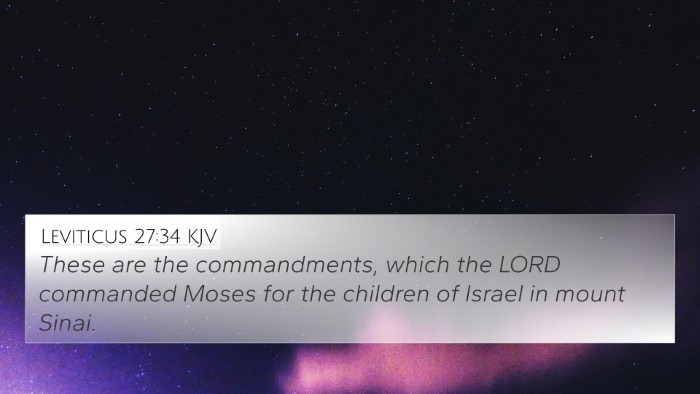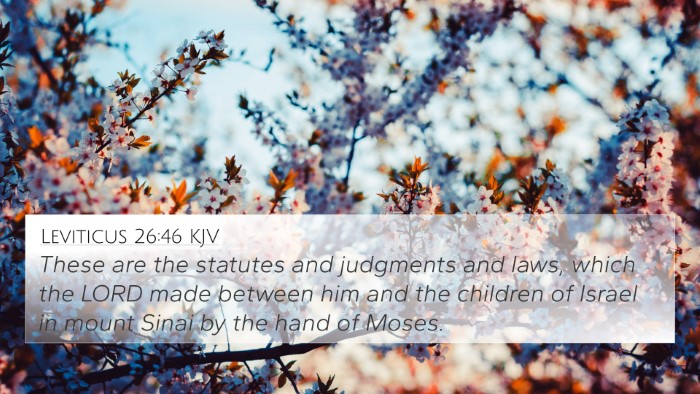Understanding Numbers 36:13
Verse Context: Numbers 36:13 states, "These are the commandments and the judgments, which the LORD commanded by the hand of Moses unto the children of Israel in the plains of Moab by Jordan near Jericho." This verse serves as a concluding remark for the book of Numbers, summarizing the prior commands given to the Israelites.
Insights from Public Domain Commentaries
This verse emphasizes the authority and source of the laws given to the Israelites. Below are the summarized insights from notable biblical commentaries:
-
Matthew Henry:
Henry highlights the importance of divine authority in the commandments. He notes that the instructions given by Moses were not merely human but were directly from God. This connection reinforces the importance of obedience to God's laws as foundational to Israel's covenant relationship.
-
Albert Barnes:
Barnes points out that the location of these commands, "by the hand of Moses in the plains of Moab," signifies a moment of transition for the Israelites. They are on the verge of entering the Promised Land, marking the need for strict adherence to God's laws as they embark on this new journey.
-
Adam Clarke:
Clarke elaborates on the significance of the commandments being given at this specific time. He explains that as the Israelites were about to settle in Canaan, it was crucial for them to have clear guidelines. Clarke stresses that these commandments guided not just personal conduct but also the community's social structure.
Inter-Biblical Connections
Numbers 36:13 is part of a broader narrative and can be linked with various other scripture passages, which collectively enhance the understanding of God's laws and their relevance for Israel. Below are notable cross-references:
- Deuteronomy 1:1-5: These verses also recount the commandments given to Israel, emphasizing their importance before entering Canaan.
- Exodus 20:1-17: The Ten Commandments showcase foundational laws that the Israelites were required to follow.
- Leviticus 26:1-13: Here, God explains the blessings of obedience versus the consequences of disobedience to His statutes.
- Joshua 1:8: This verse emphasizes the need to meditate on God's law as they prepare to take possession of the Promised Land.
- Psalm 119:1-2: Highlights the blessings and happiness that come from walking in accordance with God's laws.
- Jeremiah 31:33: This passage speaks to God's promise of a new covenant, emphasizing a relationship defined by internalizing His commandments.
- Romans 10:4: Paul discusses Christ being the end of the law for righteousness, linking the Old Testament commands with New Testament fulfillment.
- Ephesians 2:14-15: Describes how Christ abolished the laws contained in ordinances, indicating a transition in how God's laws are perceived in the New Covenant.
- Hebrews 8:10: Reinforces the promise that God will write His laws on their hearts, moving away from just external adherence.
Thematic Connections
Numbers 36:13 encapsulates a broader theme in the Bible regarding the relationship between laws and their divine origin. The act of documenting these commandments serves as a reminder of God's governance over His people, and the laws themselves constitute the moral and social framework within which they were to operate. Here are some emerging themes:
- Authority of Scripture: This verse affirms that the biblical laws are divinely inspired and must be respected as such.
- Transition and Preparedness: As the Israelites transition into a new land, the emphasis on laws shows the importance of spiritual and social preparedness.
- Community Responsibility: The laws given were not only for individuals but aimed at maintaining communal integrity and justice.
Conclusion
In studying Numbers 36:13, one can draw comprehensive insights regarding the divine nature of the commandments given to Israel, the importance of obedience, and the links between Old and New Testament teachings. The proper understanding of this verse paves the way for a richer engagement with the Scriptures and enhances one's ability to interpret and apply biblical principles today.
Key Takeaways for Cross-Referencing
Utilizing tools for Bible cross-referencing, like Bible concordances or cross-reference guides, can enhance your study of verses such as Numbers 36:13. You can identify the connections between this verse and others to develop a more intricate understanding of Biblical themes:
- Explore how laws functioned in Israel's society.
- Understand the transition from Old to New Testament perspectives on law.
- Identify shared themes and messages across different Biblical texts.
Further Study Recommendations
If you're interested in deeper study or sermon preparation, consider the following methods:
- Utilize Bible cross-reference systems to identify connections and themes.
- Engage in comparative Bible verse analysis to understand similarities across scripture.
- Implement cross-referencing Bible study methods to gather various perspectives and interpretations.













